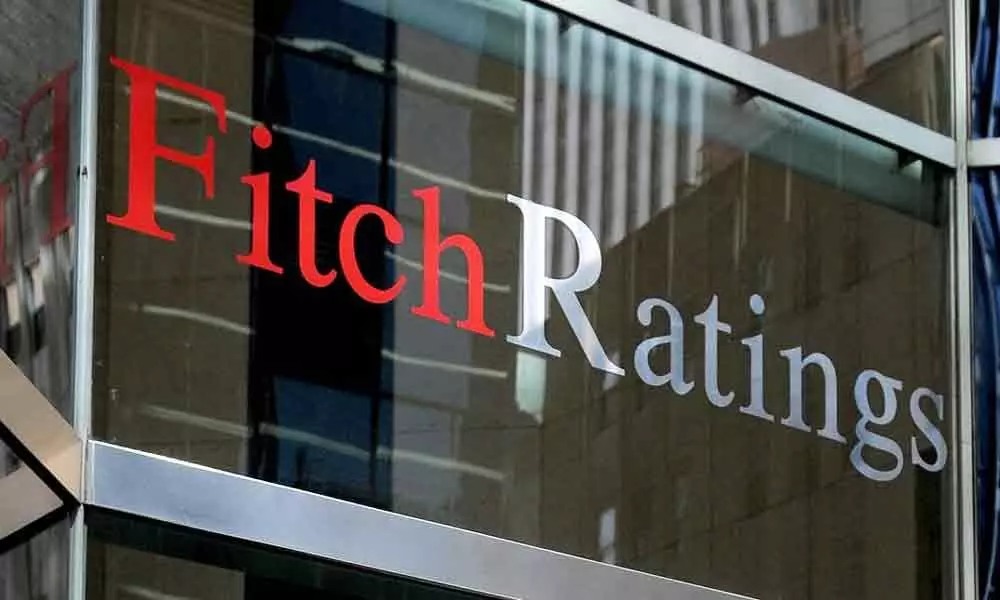India's sovereign rating will be under pressure: Fitch
 Further deterioration in the fiscal outlook as a result of lower growth or fiscal easing could pressure the sovereign rating in light of the limited fiscal headroom India had when it entered this crisis
Further deterioration in the fiscal outlook as a result of lower growth or fiscal easing could pressure the sovereign rating in light of the limited fiscal headroom India had when it entered this crisisSays the country’s debt to GDP ratio to rise to 77% in current fiscal, up from 70% in FY20
New Delhi: Fitch Ratings on Tuesday said India's sovereign rating could come under pressure if there is further deterioration in the country's fiscal outlook as a result of lower growth or fiscal easing due to the Covid-19 pandemic. The rating agency projected India's debt to GDP ratio to rise to 77 per cent in current fiscal, up from 70 per cent in 2019-20, assuming that economic growth slows and fiscal deficit widens.
Fitch also said that given the extended lockdown till May 3, India is likely to announce further fiscal easing to support growth, and its assessment of India's rating in such a case would be guided by the judgement of its probable medium-term fiscal path in the post-crisis environment.
"Further deterioration in the fiscal outlook as a result of lower growth or fiscal easing could pressure the sovereign rating in light of the limited fiscal headroom India had when it entered this crisis," Fitch said in a statement.
Fitch had in December 2019 reaffirmed India's 'BBB-' rating with a stable outlook. It said the government may tighten fiscal policy again once the pandemic is under control, but India's record of meeting fiscal targets and implementing fiscal rules has been mixed in recent years. This "will colour our assessment of any official commitment to tighten fiscal policy over the medium term", it said. The government has overshot the fiscal deficit estimate of 2019-20 fiscal.
It had originally pegged deficit at 3.3 per cent of the gross domestic product (GDP) at the time of presentation of the Union Budget in July last year but, in revised estimates, the deficit is pegged higher at 3.8 per cent.
For 2020-21, the fiscal deficit has been estimated at 3.5 per cent of GDP. Fitch has cut its economic growth forecast for India to 0.8 per cent for the fiscal year FY21, reflecting the impact of the coronavirus pandemic, down sharply from its forecast of 5.6 per cent prior to the outbreak.
"We expect growth to rebound to 6.7 per cent in FY22, but there is a risk that the crisis could amplify fiscal and financial sector strains and hurt the country's growth prospects over the medium term," Fitch added. Saying that the country has limited fiscal space to respond to the challenges posed by the health crisis, Fitch said general government debt stood at 70 per cent of GDP in FY20, according to our estimate, well above the 'BBB' median of 42 per cent.
"India's relatively robust external position supports its sovereign rating and has helped to offset its comparatively weaker fiscal metrics. We now expect India's ratio of public debt/GDP to rise to over 77 per cent of GDP in FY21 - up from a forecast of 71 per cent when we affirmed the rating in December - and to stay on an upward track in FY22," Fitch said. Besides healthcare cost, the government is also faced with the additional burden of giving booster or stimulus to sectors and industries hit by a nationwide lockdown. The lockdown that began on March 25, was extended until May 3.
Late last month, the government had announced a Rs 1.7 lakh crore stimulus package comprising of free foodgrains and cooking gas to poor and cash dole to poor women and elderly. A second package, aimed at industries, is said to be in works and is likely to be announced shortly.
Fitch said the authorities have eased monetary policy significantly to support the economy. The Reserve Bank of India has cut the repo rate to 4.40 per cent the reserve repo rate to 3.75 per cent. It has also provided liquidity through long-term repo operations. Prudential requirements for banks have also been eased to free up liquidity for lending.
"Risks to the medium-term economic outlook will increase if India experiences another bout of stress in its financial system. The current slowdown will reverse at least some of the improvement of the past few years in banking-sector health. Prolonged financial-sector weakness could weigh on credit growth, economic output, investment and productivity," Fitch said.

